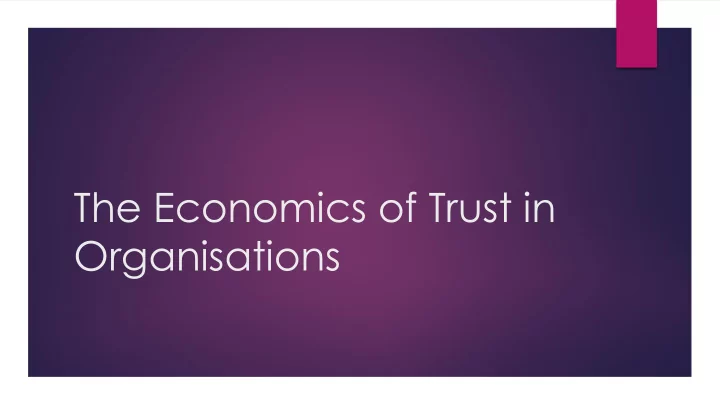

The Economics of Trust in Organisations
Trust Trust is the voluntary acceptance of vulnerability based upon positive expectations of the intention or behaviour of another. Key components of TRUST include (1) the recognition of vulnerability to opportunism; (2) the willingness to assume risk where absolute control over opportunistic behaviour is not possible; (3) the use of both genuine trust and surrogate trust (trust substitutes like contracts) in exchange relationships, where the reasonable use of substitutes is not perceived as damaging to the relationship, but rather is an appropriate measure necessary to build the foundation for maturing trust.
Dynamics of Trust Trust exists when the anticipated trust is matched by experienced trust. Overtrusting is when one anticipates a higher level of trust than experienced. Leads to the chance of one party acting opportunistically due to vulnerability. Undertrusting is when one anticipates a lower level of trust than experienced. Leads to potential distrust and/or inefficient and costly transactions. Optimal trust is when anticipated trust is closely or identically matched with the trust experienced.
Trust Model Optimal Trust Path High Experienced Trust II. Optimal Trust I. Undertrust Low High Anticipated Anticipated Trust Trust IV. Overtrust III. Optimal Trust Low Experienced Trust
Economic Benefits of Trust Contracting & Negotiation Invest in trust early and you can do a number of transactions on that pool of trust. Reduces legal fees. Fewer resources are expended and over a shorter time. Doing deals faster may be a competitive advantage in the marketplace.
Economic Benefits of Trust Hiring Practices Hiring on the recommendation of trusted individuals reduces the number of activities necessary to hire and may result in better candidates. Paying large fees for services such as head hunters is avoided.
Economic Benefits of Trust Retention Employees and customers tend to stay with the company longer when there is trust. Costs associated with severance, hiring, training and selling are reduced when turnover is low .
Economic Benefits of Trust Flattening the Organisation Trust allows for fewer people to be responsible for more activities – it reduces the need for multiple layers of expensive management oversight. Allows for greater profitability .
Economic Benefits of Trust Rapid Adaptation to Change When trust is pervasive throughout the organisation, people have greater autonomy in decision-making and can respond faster to changes in the market. Responding to changing market requirements faster than the competition is seen as a great advantage.
Economic Benefits of Trust Greater Financial Stability It is suggested that the more the company is trusted by investors, the more likely they are to hold their stock during rough periods. Share price stability during difficult times is of great economic value to the organisation.
Other Trust Considerations Account of trust – Trust as currency - acts as a buffer - can be invested or withheld like any other asset of the organisation. Limits to trust: The Trust Paradox - If there is too much shared vulnerability, the gap is so large that trust can’t fill it. Concern over the amount of risk itself may be sufficient to cause a loss of trust. The Trust Paradox places a cap on the value of trust. Opportunity Costs - To illustrate this concept, consider the costs of turnover in a sales organisation where the turnover can be attributed to a loss of trust. There are the traditional costs associated with turnover such as severance packages, search firms, and training new salespeople. But what about the costs associated with the customers that aren’t being called upon because of the search and training activities being carried out by sales employees and executives? The hours spent addressing turnover are hours not spent devoted to generating new sales. The lost opportunities in this case are the revenue generating customers that were not acquired because the revenue generating employees were spending time hiring replacements for the departed employees.
CDA and Trust What is Country Digital Acceleration (CDA)? 29 countries, 60% of population, 75% of global GDP Why do world leaders work with us? Built on TRUST Trust vs. well-functioning of the institution Extreme vulnerability on both sides Trust built one interaction at a time – no room for breach of any kind Trust transference Long-term commitments
Conclusion Questions?
Recommend
More recommend